
 |
||||||
|
GAY
FILM REVIEWS BY MICHAEL D. KLEMM
|
||||||
|
Maurice Criterion
Collection Director:
Screenplay:
Starring:
Rated R, 140 minutes |
Merry
Old England
To state the obvious, early twentieth century Edwardian England was not a good time to be gay. The climate was so bad that noted novelist E.M. Forster began writing a book with a homosexual hero in 1913 that he never published in his lifetime. It finally saw the light of day in 1971, a year after he died at the age of 91. That book, of course, is Maurice and it ignited a firestorm amongst scholars who refused to acknowledge the author's sexual identity. In 1987, Merchant Ivory Productions adapted the book to the screen as the second of three films to celebrate Forster's novels; the other two being A Room With A View and Howard's End. (Forster also wrote A Passage To India and the libretto to Benjamin Britten's 1951 opera of Herman Melville's Billy Budd.) |
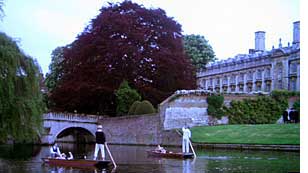 Maurice
is a story of its times and is therefore as much concerned with class distinctions
as it is with the era's hostile attitudes towards homosexuality. This will
be discussed in more detail later. The film, typical of Merchant Ivory Productions,
is a sumptuous recreation of Edwardian England with superb performances
and a meticulous attention to period detail. It is a rich filmgoing experience
and one of the most beautiful films in all of queer cinema. Maurice
is a story of its times and is therefore as much concerned with class distinctions
as it is with the era's hostile attitudes towards homosexuality. This will
be discussed in more detail later. The film, typical of Merchant Ivory Productions,
is a sumptuous recreation of Edwardian England with superb performances
and a meticulous attention to period detail. It is a rich filmgoing experience
and one of the most beautiful films in all of queer cinema. |
|
|
|
|
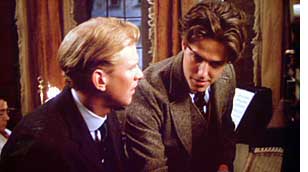 The
turning point occurs when a foppish acquaintance from Cambridge named Lord
Risley (an Oscar Wilde clone)
is arrested on a "morals charge" and sent to prison. The scandal occupies
the front page of the newspapers. Clive is so horrified by this monstrous
turn of events that he falls into a swoon as if he were the heroine of a
Victorian novel. Maurice becomes equally devastated when Clive abruptly
declares his intentions to marry and fulfill the aristocratic position that
awaits him in public life. "Think how easy life is," Clive pleads, "For
people who don't have to go through all this... secrecy. Never being able
to talk about the person whom you're in love with to anybody. Imagining
the servants are thinking things." Their break-up isn't pretty but they
remain uneasy friends. The
turning point occurs when a foppish acquaintance from Cambridge named Lord
Risley (an Oscar Wilde clone)
is arrested on a "morals charge" and sent to prison. The scandal occupies
the front page of the newspapers. Clive is so horrified by this monstrous
turn of events that he falls into a swoon as if he were the heroine of a
Victorian novel. Maurice becomes equally devastated when Clive abruptly
declares his intentions to marry and fulfill the aristocratic position that
awaits him in public life. "Think how easy life is," Clive pleads, "For
people who don't have to go through all this... secrecy. Never being able
to talk about the person whom you're in love with to anybody. Imagining
the servants are thinking things." Their break-up isn't pretty but they
remain uneasy friends. |
|
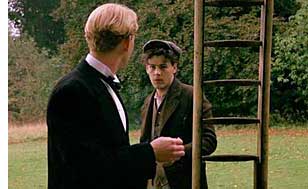 In
part two, Maurice is a frequent guest at Clive's ancestral estate. Clive
is married and observing all the proper forms while Maurice pines for his
lost love. Before long, he unexpectedly enters into an affair with Alec
Scudder (Rupert Graves), the young and uncouth under-gamekeeper who has
been watching him with keen interest. One night, he awakes from a nightmare
as Scudder climbs into his window and joins him in bed (mirroring a much
earlier scene in which Maurice crawled through Clive's window at Cambridge).
With this bold act, Maurice's transgression crosses both sexual and
class boundaries as he dares to cavort with his social inferior. In
part two, Maurice is a frequent guest at Clive's ancestral estate. Clive
is married and observing all the proper forms while Maurice pines for his
lost love. Before long, he unexpectedly enters into an affair with Alec
Scudder (Rupert Graves), the young and uncouth under-gamekeeper who has
been watching him with keen interest. One night, he awakes from a nightmare
as Scudder climbs into his window and joins him in bed (mirroring a much
earlier scene in which Maurice crawled through Clive's window at Cambridge).
With this bold act, Maurice's transgression crosses both sexual and
class boundaries as he dares to cavort with his social inferior. |
|
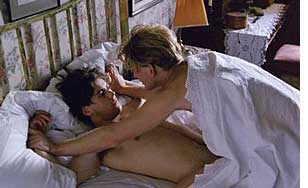 Maurice
offered something virtually unprecedented in queer fiction - the two lovers
were allowed a happy ending. In an epilogue to Maurice,
written in 1960, Forster explains his insistence that the story end happily
even though he well knew that, given societal prejudice, such a thing would
rarely be possible. While this might not be realistic, it is nevertheless
affirming, at least in a fairy tale sort of way. Forster is to be commended
for not ending the book with the obligatory suicide and it is a shame that
Maurice wasn't published during
his lifetime. Some may call this cowardice on the author's part, but Forster
simply didn't want to be bothered with the inevitable scandals. (He did,
however, show it to a few carefully selected friends, such as fellow gay
novelist Christopher Isherwood.) Maurice
offered something virtually unprecedented in queer fiction - the two lovers
were allowed a happy ending. In an epilogue to Maurice,
written in 1960, Forster explains his insistence that the story end happily
even though he well knew that, given societal prejudice, such a thing would
rarely be possible. While this might not be realistic, it is nevertheless
affirming, at least in a fairy tale sort of way. Forster is to be commended
for not ending the book with the obligatory suicide and it is a shame that
Maurice wasn't published during
his lifetime. Some may call this cowardice on the author's part, but Forster
simply didn't want to be bothered with the inevitable scandals. (He did,
however, show it to a few carefully selected friends, such as fellow gay
novelist Christopher Isherwood.) |
|
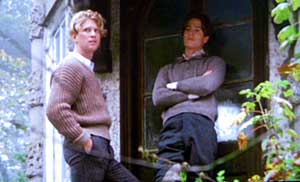 The
film of Maurice is a marvelous
adaptation of a classic novel and one of the best that modern cinema has
given us. The film follows the book rather closely, often lifting large
chunks of dialogue verbatim, but also adding a few distinct improvements.
The character of Lord Risley was smaller in the novel and he was not arrested
for buggery as he is in the film. By showing his arrest and enforcing the
harsh sentence, the film is able to both dramatize the dangers of being
homosexual in Edwardian England and provide a clearer motivation for Clive's
sudden rejection of Maurice. It is also worth noting that, as in the trials
of Oscar Wilde before him, the judge makes it clear that, because Risley
is "a man of breeding," his corruption of the lower classes is an equally
abominable offense. The
film of Maurice is a marvelous
adaptation of a classic novel and one of the best that modern cinema has
given us. The film follows the book rather closely, often lifting large
chunks of dialogue verbatim, but also adding a few distinct improvements.
The character of Lord Risley was smaller in the novel and he was not arrested
for buggery as he is in the film. By showing his arrest and enforcing the
harsh sentence, the film is able to both dramatize the dangers of being
homosexual in Edwardian England and provide a clearer motivation for Clive's
sudden rejection of Maurice. It is also worth noting that, as in the trials
of Oscar Wilde before him, the judge makes it clear that, because Risley
is "a man of breeding," his corruption of the lower classes is an equally
abominable offense. |
|
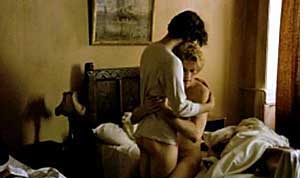 As
noted earlier, notions of class differences are as important to an appreciation
of Maurice as its exploration
of repressed sexuality. In this vein, Maurice's affair with the servant
Scudder is a double crime against society. These themes are also shared
by D.H. Lawrence's notorious banned book, Lady Chatterley's Lover (1928).
Lady Chatterley also takes a lover beneath her social status (outlaw authors
seemed to love this topic). The public outcry against this book (it was
published only in clandestine editions for several decades) may have reinforced
Forster's decision to keep his 1913 Maurice
out of the public view. (However, Forster was one of the few writers to
defend Lawrence's literary reputation when he died two years after completing
Lady Chatterley's Lover, and he also testified at a 1960 obscenity trial
surrounding the book's first legitimate publication in Great Britain.) As
noted earlier, notions of class differences are as important to an appreciation
of Maurice as its exploration
of repressed sexuality. In this vein, Maurice's affair with the servant
Scudder is a double crime against society. These themes are also shared
by D.H. Lawrence's notorious banned book, Lady Chatterley's Lover (1928).
Lady Chatterley also takes a lover beneath her social status (outlaw authors
seemed to love this topic). The public outcry against this book (it was
published only in clandestine editions for several decades) may have reinforced
Forster's decision to keep his 1913 Maurice
out of the public view. (However, Forster was one of the few writers to
defend Lawrence's literary reputation when he died two years after completing
Lady Chatterley's Lover, and he also testified at a 1960 obscenity trial
surrounding the book's first legitimate publication in Great Britain.) |
|
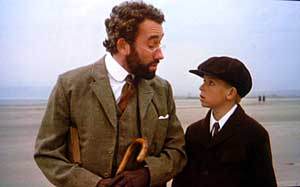 The
themes that are explored in Maurice
are clearly established in the opening scene of both the novel and the film.
Maurice, as a young boy, is being told "the facts of life" by Mr. Ducie,
his prep school teacher (beautifully embodied with great rectitude by the
great Simon Callow).
Ducie calls it "the great mystery of sex." Maurice is told that his body
is God's "temple" and that it must never be abused. His greatest aspiration
should be to one day fulfill his destiny by marrying a woman and producing
children. Ducie's wish to instruct the father-less lad is noble but also
ultimately comic when he starts to draw anatomical diagrams in the sand.
Maurice flippantly replies that he will never marry. The
themes that are explored in Maurice
are clearly established in the opening scene of both the novel and the film.
Maurice, as a young boy, is being told "the facts of life" by Mr. Ducie,
his prep school teacher (beautifully embodied with great rectitude by the
great Simon Callow).
Ducie calls it "the great mystery of sex." Maurice is told that his body
is God's "temple" and that it must never be abused. His greatest aspiration
should be to one day fulfill his destiny by marrying a woman and producing
children. Ducie's wish to instruct the father-less lad is noble but also
ultimately comic when he starts to draw anatomical diagrams in the sand.
Maurice flippantly replies that he will never marry. |
|
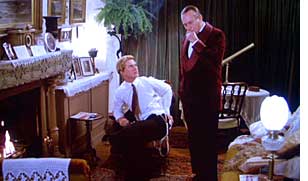 And
what about the attitudes of the time regarding homosexuality itself? Aside
from the entrapment and arrest of Lord Risley, here are a few other examples.
During an early scene, Maurice and several schoolmates are taking turns
reading, and translating aloud, verses from Plato's Symposium in
the Dean's parlour. As one of the students stumbles through a passage about
Zeus and Ganymede, the Dean mutters, "Omit the reference to the unspeakable
vice of the Greeks." Maurice is later taken aback by Clive's first declaration
of love and panics. "I thought it was the worst crime in the calendar,"
Maurice protests as he returns to apologize, "The one subject absolutely
beyond the limit." And
what about the attitudes of the time regarding homosexuality itself? Aside
from the entrapment and arrest of Lord Risley, here are a few other examples.
During an early scene, Maurice and several schoolmates are taking turns
reading, and translating aloud, verses from Plato's Symposium in
the Dean's parlour. As one of the students stumbles through a passage about
Zeus and Ganymede, the Dean mutters, "Omit the reference to the unspeakable
vice of the Greeks." Maurice is later taken aback by Clive's first declaration
of love and panics. "I thought it was the worst crime in the calendar,"
Maurice protests as he returns to apologize, "The one subject absolutely
beyond the limit." |
|
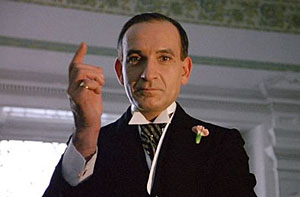 In
another, almost comic, scene, Maurice visits an old family friend, Dr. Barry
(Denholm Elliott), to discuss a problem and the doctor immediately assumes
that his young charge has a venereal disease. When Maurice confesses that
he's "like Lord Risley. I'm an unspeakable. Of the Oscar Wilde sort," Dr.
Barry dismisses it as "rubbish" and suggests that he find himself a nice
girl and he will be cured. In desperation, Maurice pays several visits to
a hypnotist, played by Ben Kingsley, for a cure. (The hypnotist features
prominently in the nightmare that Maurice has when Scudder climbs the ladder
into his room.) After Maurice confesses his tryst with Alec Scudder, the
doctor senses that his treatments will be futile. "I needn't remind you
that your sort were once put to death in England," the doctor states, and
suggests that Maurice move to some country like France or Italy where homosexuality
is no longer criminal. When Maurice asks if it will ever be like that in
England, the doctor sadly remarks that "England has always been disinclined
to accept human nature." Suspense is generated in the last act when Maurice
fears that Scudder is going to blackmail him. This was a real danger at
the time, and for many decades afterwards (see 1961's Victim
for another story about blackmailing homosexuals in England). In
another, almost comic, scene, Maurice visits an old family friend, Dr. Barry
(Denholm Elliott), to discuss a problem and the doctor immediately assumes
that his young charge has a venereal disease. When Maurice confesses that
he's "like Lord Risley. I'm an unspeakable. Of the Oscar Wilde sort," Dr.
Barry dismisses it as "rubbish" and suggests that he find himself a nice
girl and he will be cured. In desperation, Maurice pays several visits to
a hypnotist, played by Ben Kingsley, for a cure. (The hypnotist features
prominently in the nightmare that Maurice has when Scudder climbs the ladder
into his room.) After Maurice confesses his tryst with Alec Scudder, the
doctor senses that his treatments will be futile. "I needn't remind you
that your sort were once put to death in England," the doctor states, and
suggests that Maurice move to some country like France or Italy where homosexuality
is no longer criminal. When Maurice asks if it will ever be like that in
England, the doctor sadly remarks that "England has always been disinclined
to accept human nature." Suspense is generated in the last act when Maurice
fears that Scudder is going to blackmail him. This was a real danger at
the time, and for many decades afterwards (see 1961's Victim
for another story about blackmailing homosexuals in England). |
|
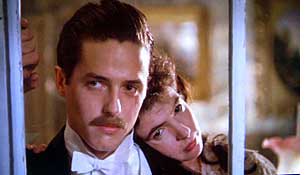 As
established by Mr. Ducie's teachings, nothing is more important to the perpetuation
of polite society than the appearance of an upright and proper marriage.
Maurice, even as a child, is out of step with the world at large and sees
Ducie's lessons as lies when his teacher suddenly panics that the tide might
not wash away his sand drawings before another strolling family comes upon
them. Maurice will reject this world, and all its hypocritical trappings,
when he risks everything to be with Scudder. "What a grotesque announcement,"
is all Clive can say in the penultimate scene. As the film ends, Clive is
looking out his window, his wife standing behind him, as Maurice disappears
into the trees. He then sees the young Maurice at Cambridge, beckoning to
him, but all he can do is look on in sadness at the life that he could have
had. As
established by Mr. Ducie's teachings, nothing is more important to the perpetuation
of polite society than the appearance of an upright and proper marriage.
Maurice, even as a child, is out of step with the world at large and sees
Ducie's lessons as lies when his teacher suddenly panics that the tide might
not wash away his sand drawings before another strolling family comes upon
them. Maurice will reject this world, and all its hypocritical trappings,
when he risks everything to be with Scudder. "What a grotesque announcement,"
is all Clive can say in the penultimate scene. As the film ends, Clive is
looking out his window, his wife standing behind him, as Maurice disappears
into the trees. He then sees the young Maurice at Cambridge, beckoning to
him, but all he can do is look on in sadness at the life that he could have
had. |
|
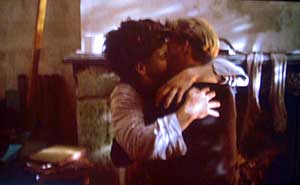 The
cast is superb and truly brings this tale to life. Though each of the three
principals are straight, it is a credit to them that they embraced these
roles with such gusto. (Remember that this 1987 when playing gay wasn't
yet the sure ticket to an Oscar nomination.) Because Clive kept chaste with
Maurice, we never see them without clothes but their scenes together - especially
the tender touches and embraces between them - evoke the fire of Heathcliff
and Catherine in a Bronte novel. Maurice and Alec, on the other hand, are
seen naked together and the fierce passion they share in bed was quite
bold on the film's first release. The film also features a fine pedigree
of English actors. Billie Whitelaw appears as Maurice's mother and two gay
elder statesmen, Simon Callow and Denholm Elliott, memorably portray Mr.
Ducie and Dr. Barry. The
cast is superb and truly brings this tale to life. Though each of the three
principals are straight, it is a credit to them that they embraced these
roles with such gusto. (Remember that this 1987 when playing gay wasn't
yet the sure ticket to an Oscar nomination.) Because Clive kept chaste with
Maurice, we never see them without clothes but their scenes together - especially
the tender touches and embraces between them - evoke the fire of Heathcliff
and Catherine in a Bronte novel. Maurice and Alec, on the other hand, are
seen naked together and the fierce passion they share in bed was quite
bold on the film's first release. The film also features a fine pedigree
of English actors. Billie Whitelaw appears as Maurice's mother and two gay
elder statesmen, Simon Callow and Denholm Elliott, memorably portray Mr.
Ducie and Dr. Barry. |
|
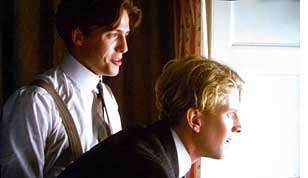 On
all levels, Maurice is an exquisitely
executed film and the two disc DVD does it justice. There are marvelous
interviews with longtime life partners James Ivory and the late Ismail Merchant,
as well as each of the principal actors. Lovers of the film will be enthralled
by more than a half hour of deleted scenes, including two major subplots,
that were eliminated in order to keep the film from being three hours long.
One entails Maurice's clumsy and futile attempts to seduce a young houseguest,
and another the suicide of Lord Risley. On
all levels, Maurice is an exquisitely
executed film and the two disc DVD does it justice. There are marvelous
interviews with longtime life partners James Ivory and the late Ismail Merchant,
as well as each of the principal actors. Lovers of the film will be enthralled
by more than a half hour of deleted scenes, including two major subplots,
that were eliminated in order to keep the film from being three hours long.
One entails Maurice's clumsy and futile attempts to seduce a young houseguest,
and another the suicide of Lord Risley. |
|
|
A
NOTE ON THE NOVEL'S GENESIS |
|
|
|
|
I guess this cynical reviewer can be a romantic sometimes because I can't think of a more awesome way for a work of art to have been conceived. This is why Forster gave Maurice and Alec a happy ending. He saw that it was possible... rare, but possible. Knowing all this, the ending of Maurice becomes even happier now, doesn't it? If you've never seen it, check it out. It is a masterpiece.
More
on Merchant Ivory: Simon Callow also
appears in: |